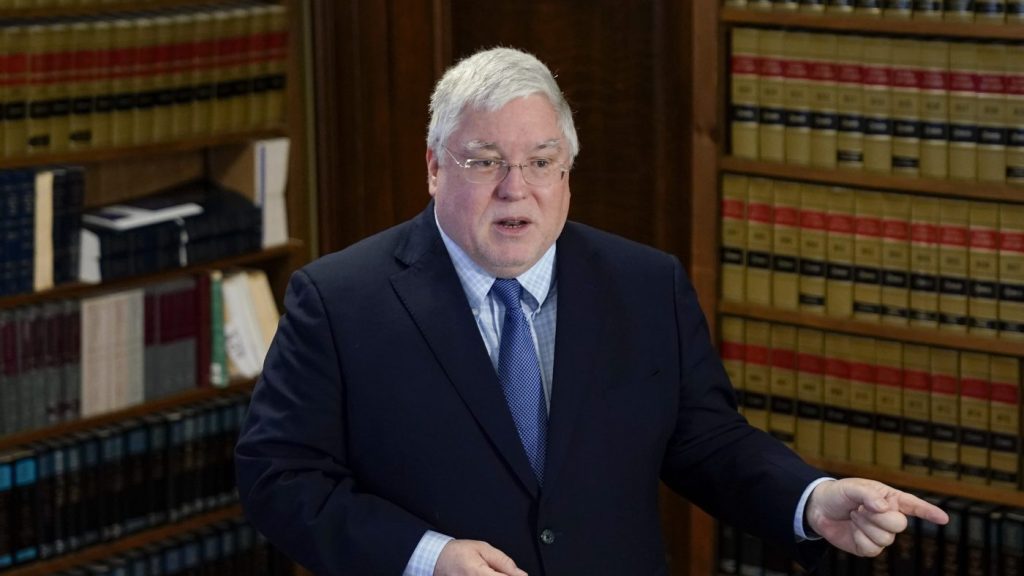West Virginia plans to ask the U.S. Supreme Court to hear a case again regarding the state’s limitations on transgender student-athletes, according to its attorney general on Wednesday.
West Virginia Attorney General Patrick Morrisey, a Republican, told reporters on Wednesday at a news conference in Charleston, W.Va. that this case is important to bring to the Supreme Court and might establish a precedent for the entire country.
Morrisey, who is currently campaigning for governor, said that West Virginia will file its appeal to the Supreme Court within the next month and ensure proper timing to maximize the chance of the case being heard and ultimately winning.
West Virginia passed a law in 2021 that prevents transgender women and girls from participating in female sports teams, and the state’s Save Women’s Sports Act requires sports participation to be based on “biological sex” rather than gender identity in public schools and colleges.
Currently, 24 states have laws in place that prohibit student-athletes from competing based on their gender identity, although not all are enforceable, according to the Movement Advancement Project, a nonprofit tracking LGBTQ laws. The federal appeals court recently prevented West Virginia from enforcing its law, ruling in favor of a transgender teenager who sued the state after being barred from trying out for the girls cross-country and track teams at her school.The 4th U.S. Circuit Court of Appeals found that the state’s law violates Title IX, the federal civil rights law that prohibits sex-based discrimination in federally funded schools and education programs, in a 2-1 ruling.
Last week, the Biden administration issued new rules firming up protections for LGBTQ students under Title IX by expanding the law’s definition of sex discrimination to include sexual orientation and gender identity, but has yet to finalize a separate rule governing athletics eligibility. West Virginia Attorney General Morrisey criticized the circuit court’s reasoning in concluding that the law discriminates against transgender athletes as “flawed. The Biden administration
issued new rules last week solidifying protections for LGBTQ students under Title IX by broadening the law’s definition of sex discrimination to cover sexual orientation and gender identity, but has not yet completed a separate rule governing athletics participation. Morrisey, who argued for the state, disagrees with the 4th Circuit majority's conclusion that this law targeted transgender students.
Becky Pepper-Jackson, the 13-year-old at the center of the case, has been allowed to join her school’s girls cross-country team since the law was blocked in February 2023. One of her classmates joined Morrisey in supporting the state’s transgender athlete restrictions Wednesday.
The American Civil Liberties Union (ACLU), the ACLU of West Virginia and Lambda Legal, the organizations representing Pepper-Jackson in court, did not immediately return a request for comment.
After Morrisey’s announcement, Fairness West Virginia, a statewide LGBTQ advocacy group, stated that laws like West Virginia’s “contribute to a hostile environment where trans youth are more likely to experience harassment, bullying and discrimination.”
The Supreme Court may or may not consider the state's case once its appeal is submitted, as the court refused to get involved last year.
In refused to get involved Clarence Thomas and Samuel Alito, who are the court's leading conservatives, stated that they would have listened to the case. They mentioned that it deals with an important issue that the Court is likely to have to deal with soon.
West Virginia's attorney general stated that West Virginia is planning to request the U.S. Supreme Court to hear a case regarding the state's limitations on transgender student-athletes for a second time. He mentioned, 'This is a significant case to bring to the Supreme Court, and it will potentially set precedent for the entire country.' declined to intervene on the law. Justices Clarence Thomas and Samuel Alito, the court’s leading conservatives, said they would have heard the case, which they said “concerns an important issue that this Court is likely to be required to address in the near future.”









